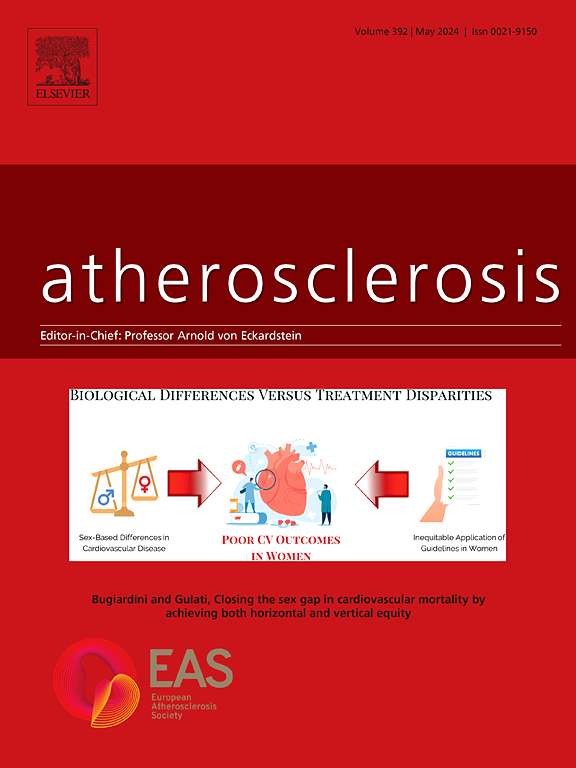Association of Lipoprotein(a) with cardiovascular events among individuals with autoimmune conditions
IF 4.9
2区 医学
Q1 CARDIAC & CARDIOVASCULAR SYSTEMS
引用次数: 0
Abstract
Background
Autoimmune conditions are associated with systemic inflammation, which elevates the risk of major adverse cardiovascular events (MACE). Systemic inflammation can increase plasma lipoprotein(a) [Lp(a)] levels by activating the interleukin-6 response element within the LPA gene promoter region. However, the association between elevated plasma Lp(a) and MACE risk in individuals with autoimmune conditions remains unclear.
Methods
We analyzed data from 353,035 UK Biobank participants without cardiovascular disease, including 11,229 individuals with autoimmune conditions such as systemic lupus erythematosus, rheumatoid arthritis, psoriasis, multiple sclerosis, and others. Cox proportional hazards regression models and Kaplan-Meier survival curves assessed the association between elevated Lp(a) (≥125 nmol/L), autoimmune status, and time to MACE (myocardial infarction, stroke, cardiovascular death).
Results
Over a median follow-up of 14 years, 19,091 MACEs occurred. Autoimmune conditions (HR, 1.30; 95 % CI, 1.20–1.41; P < 0.001) and elevated Lp(a) (HR, 1.24; 95 % CI, 1.18–1.30; P < 0.001) were independently associated with increased MACE risk. The interaction between autoimmune conditions and elevated Lp(a) was not significant (p = 0.40). Compared to participants with neither risk factor, those with both autoimmune conditions and elevated Lp(a) had the highest MACE risk (HR, 1.77; 95 % CI, 1.46–2.15; P < 0.001). Elevated MACE risk was also observed in individuals with only elevated Lp(a) (HR, 1.23; 95 % CI, 1.17–1.29; P < 0.001) or only autoimmune conditions (HR, 1.28; 95 % CI, 1.18–1.40; P < 0.001).
Conclusion
Autoimmune disease status and elevated Lp(a) level have an independent and additive joint association with MACE risk. This may have implications for Lp(a) lowering therapy use in high-risk primary prevention populations.

自身免疫性疾病患者中脂蛋白(a)与心血管事件的关系
自身免疫性疾病与全身性炎症相关,这会增加主要不良心血管事件(MACE)的风险。全身性炎症可通过激活LPA基因启动子区域内的白介素-6反应元件,使血浆脂蛋白(a) [Lp(a)]水平升高。然而,自身免疫性疾病患者血浆Lp(a)升高与MACE风险之间的关系尚不清楚。方法:我们分析了来自353035名英国生物银行无心血管疾病参与者的数据,其中包括11229名自身免疫性疾病患者,如系统性红斑狼疮、类风湿性关节炎、牛皮癣、多发性硬化症等。Cox比例风险回归模型和Kaplan-Meier生存曲线评估了Lp(a)升高(≥125 nmol/L)、自身免疫状态和MACE(心肌梗死、卒中、心血管死亡)发生时间之间的关系。结果在14年的中位随访中,发生了19091例mace。自身免疫性疾病(HR, 1.30;95% ci, 1.20-1.41;P & lt;0.001)和Lp升高(a) (HR, 1.24;95% ci, 1.18-1.30;P & lt;0.001)与MACE风险增加独立相关。自身免疫性疾病与Lp(a)升高之间的相互作用不显著(p = 0.40)。与没有危险因素的参与者相比,同时存在自身免疫性疾病和Lp(a)升高的参与者MACE风险最高(HR, 1.77;95% ci, 1.46-2.15;P & lt;0.001)。仅Lp(a)升高的个体也观察到MACE风险升高(HR, 1.23;95% ci, 1.17-1.29;P & lt;0.001)或仅存在自身免疫性疾病(HR, 1.28;95% ci, 1.18-1.40;P & lt;0.001)。结论自身免疫性疾病状态和Lp(a)水平升高与MACE风险有独立的、附加的联合关系。这可能对Lp(a)在高危一级预防人群中降低治疗使用具有启示意义。
本文章由计算机程序翻译,如有差异,请以英文原文为准。
求助全文
约1分钟内获得全文
求助全文
来源期刊

Atherosclerosis
医学-外周血管病
CiteScore
9.80
自引率
3.80%
发文量
1269
审稿时长
36 days
期刊介绍:
Atherosclerosis has an open access mirror journal Atherosclerosis: X, sharing the same aims and scope, editorial team, submission system and rigorous peer review.
Atherosclerosis brings together, from all sources, papers concerned with investigation on atherosclerosis, its risk factors and clinical manifestations. Atherosclerosis covers basic and translational, clinical and population research approaches to arterial and vascular biology and disease, as well as their risk factors including: disturbances of lipid and lipoprotein metabolism, diabetes and hypertension, thrombosis, and inflammation. The Editors are interested in original or review papers dealing with the pathogenesis, environmental, genetic and epigenetic basis, diagnosis or treatment of atherosclerosis and related diseases as well as their risk factors.
 求助内容:
求助内容: 应助结果提醒方式:
应助结果提醒方式:


